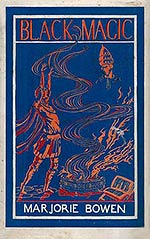
![]() Crowgirl
Crowgirl
1/27/2013
![]()
And here it is: my inaugural post for the Worlds Without End Women in Genre Fiction challenge. Since I'm librarianly minded and alphabets make me happy, I started at the beginning of the alphabet with Marjorie Bowen's 1912 Black Magic: A Tale of the Rise and Fall of Anti-Christ. (You can find a free copy on the Internet Archive.)
It's a slow burn of a story -- do not pick this up if you're in the mood for something more like David Wellington or Mira Grant. It's a deeply atmospheric novel and Bowen spends a lot of time over sensual detail: the colors of embroidery, paint, and flowers, the rustle of fabrics, the taste of food.
The two-cent synopsis is that two young students in a vaguely late medieval/early Renaissance Europe enter upon a pact to study black magic and pursue the power offered by Satan. One continues on in this path, undeterred by anything in his way; the other wavers, pulls back, frequently tries to return to Godly ways. The story finishes up with the devoted Satanist enthroned as Pope, his wavering comrade well on the way to being Holy Roman Emperor. Will it all work out? will the unGodly duo claim power over the Western world? Like I said, you can find it for free on the Internet Archive but still some spoilers may herein lurk.
The two main characters -- Dirk, our Satanic devotee, and Theirry -- are neither of them very likeable. Dirk's a bully, Theirry a minger. It's hard to feel a lot of sympathy for either of them or for any of the other characters Bowen creates. They all have a faintly cardboardy flavor to them. Dirk and, oddly, the dethroned Emperor's wife, Ysabeau, are the closest to being fully formed people. At the very least, the traps they create for themselves -- Dirk via his adherence to dark magic in his pursuit of romantic satisfaction and Ysabeau via plotting to kill her first husband in her pursuit of the man she loves -- have a sympathetic ring to them. The fact that they're both cliches doesn't make their story any less interesting to read, it just makes it harder to understand either of them as real people. Given the almost vitriolic anti-Catholicism of the story at key points, though, one wonders whether Bowen deliberately set herself up with cliches and stereotypes simply to air religious prejudice.
I'm not sure Bowen has the details of her anti-Christ quite correct; it strikes me that what I read in my exigetical class on the Bible in undergrad told a slightly different story of the rise of the final power but, really, who cares? It's a good, dramatic show-down with great images like a storm brooding over Rome for weeks on end after Dirk takes the papal throne; a plague seizing upon the city; the murdered characters returning as angels to warn the forces of good of their best moment of attack.
There is an underlying narrative in Black Magic which I originally thought was simply the fact that I have slash goggles welded to my skull. Almost every reference to either Dirk or Theurry is laded with references to their personal beauty. Dirk rarely looks at Theirry without Bowen in some way calling our attention to how lovely the student is -- or both of them are. As the story goes on, it becomes increasingly clear that Dirk is mostly likely not all he seems -- he may be playing a long-standing charade. Bowen probably explains it best when the climactic moment is nearly come. Dirk, secure for the moment in his papal palace, receives a message, brought through rampaging Roman mobs, from Theirry:
This is my message. If you are a devil, be satisfied, for your devil's work is done. If you are a man, you have befriended, wronged me, and I have avenged myself. If you are that other thing you may be, then I know you love me, and that I kissed you once.
This, of course, leaves out the equally simple explanation that Dirk could perfectly well be a man, have loved Theirry, and that they might have kissed -- a more interesting explanation than the one that seems to loom by the time Theirry writes this message.
However, Bowen doesn't quite pull back her last curtain. Instead, she has Dirk leave this somewhat opaque message in return:
If I be a devil I go whence I came, if a man I lived as one and die as one, if woman I have known Love, conquered it and by it have been vanquished.
That isn't the entire message; Bowen can't resist the temptation to write a paragraph where ten words would do. But the question of Dirk's sexuality or sexual identity is never fully solved; enough is left tantalizingly open to question at the end of the novel to keep the whole story from falling flat. Had the answer to the question been simply answered as, 'Yes, Dirk was a woman, in love with Theirry, did all of this with him in mind,' the story would fall flatter than it does. As it is, it has an odd fascination. While the characters are cardboard'y, watching them move through their paces -- the obsessed student of dark magics, the fiery Eastern woman who yearns for power, the twisted witch devoted to the devil, the weak and holy Emperor -- gives much the same satisfaction of watching an episode of a CSI or Bones. You know they're going to get the bad guy in the end, but watching them get there is amusing enough to keep you watching.
http://redcrowblog.wordpress.com